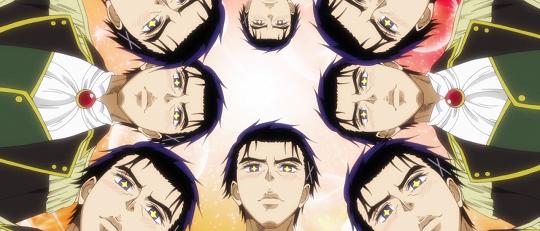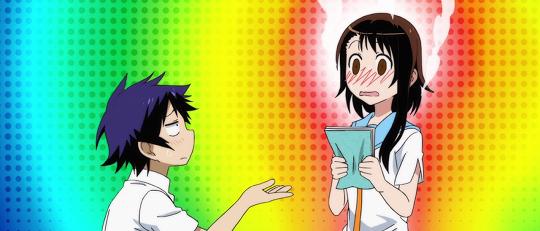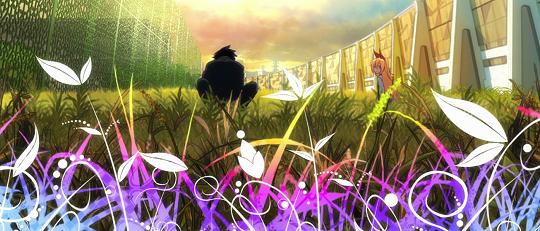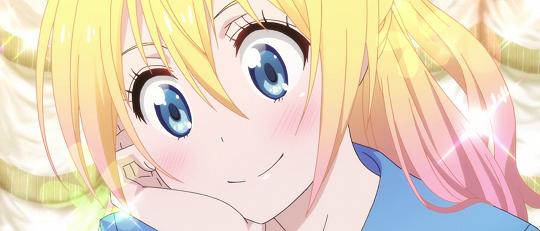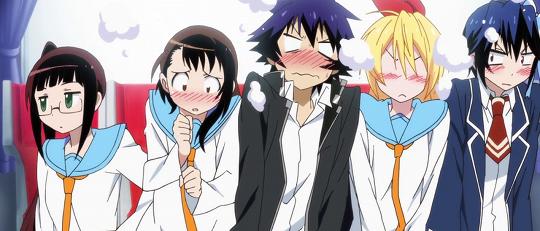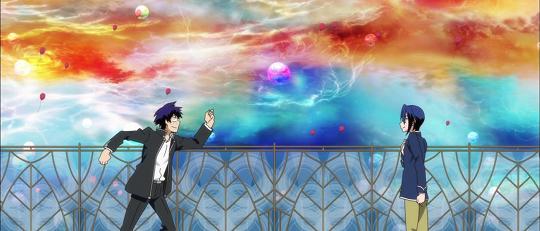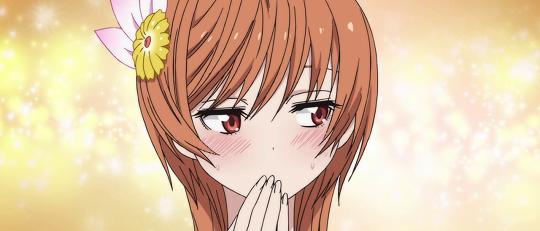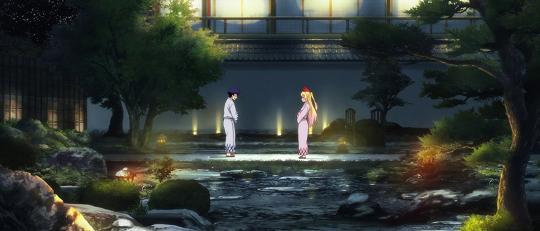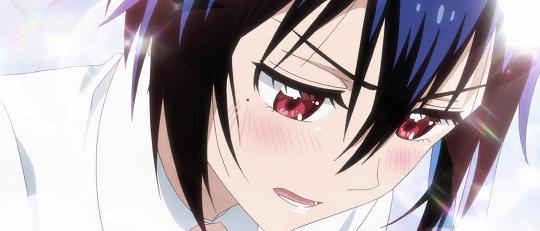Just try all the keys in the bloody pendant. I don’t care whether it’s a metaphor for sex anymore or who out of the numerous girls you made the promise to when you were a toddler, this kind of tomfoolery has gone on long enough. Based on a lot of anime, Nisekoi (False Love) especially, if I ever have children I will impress upon them the perils of making promises to childhood friends because from the evidence, all it causes is trauma further down the line.
Nisekoi’s initial hook is standard “only in anime” fare: the son of a Yakuza boss, Raku, is forced to pretend he’s romantically involved with the daughter, Chitoge, of another gang boss. The two obviously fight like cats and dogs yet must maintain the facade of a couple in love lest hostilities between the two criminal enterprises escalate into a full on street war. I say “initial” hook because although that’s all covered in the first episode, the storyline the series is more interested in telling is about the promise Raku made with an unknown girl when he was younger, a girl who holds the literal key to his figurative heart / literal pendant.
Calling it a “pendant” though is somewhat misleading if you haven’t seen the piece in question. It more resembles a slab of aluminium carved by a Satan worshipping blacksmith. How Raku wears such a hefty chunk of metal everyday without injuring himself or bystanders is a question not answered by the series. Just as the question of who Raku made his childhood promise to isn’t answered. That’s despite stretching the paper thin “oh who of these many lovely young ladies did I promise my heart to?” premise way beyond credibility, surprising me when it went past twelve episodes, then again when it finished at twenty. The final episode has no sense of climax or conclusion leaving it open for studio SHAFT to keep this plot running and running. It wouldn’t surprise me to learn that the, currently twelve volume, source manga stretched from high-school well into middle age with Raku beginning to feel his body failing yet he is still no closer to finding that girl. Meanwhile the number of ladies chasing him increased exponentially from the four covered in this series to more than fifty. All with keys. All queuing up to go on dates-not-dates with their object of affection.
It’s a typical setup for sure: you have the caustic and violent girl, Chitoge, the athletic but secretly buxom tomboy Tsugumi, the shy and demure Kosaki and, when that setup is beginning to stale, the forthright princess Marika. As a member of the audience to this romantic comedy, you are expected to play the “best girl” game and select the lady you want as a champion. Arguments abound as to who this “best girl” is but it would help if all of the options weren’t all somewhat grotesquely presented. Kosaki Onodera has the most obvious overtures towards Raku (just as he does to her) yet both spend their time treating each other as the headlights to their own deer, constantly staring wide-eyed and blushing before darting off into the undergrowth. Likewise Marika’s entrance was obviously designed to inject some drama into the tiresome holding pattern Kosaki and Chitoge had entered with Raku, yet her candidness is based on years of moulding her identity based upon the childhood babblings of Raku. That selfish and myopic fascination with Raku runs throughout all of the eligible ladies apart from Chitoge with whom an earned mutual respect is shared, built from their similar situations and a slow but steady insight into each other.
The situation may be absurd but no more than a bevy of women whose romance seems to be based on Raku not being an utter cretin like his lecherous best friend Shuu. That’s kind of the entire point of the series though because despite stretching plausibility to breaking point, this is a romantic comedy rather than simply a romance or a comedy. So whereas humour is prevalent throughout it is light-hearted, predictable and inoffensive; so too with the courtships that are forced to never be reciprocated and simply escalate in absurdity until you get episode spanning scenes like the familiar male-in-a-female-bath that just feel like a slog to get through. Compare this series with something along the lines of School Rumble or Acchi Kocchi and you see another side to the love/humour blend, making the romantic tribulations the vehicle for the comedy. Alternatively if you go for something like Kimi ni Todoke, though light hearted in places, the romance is front and centre and, more critically, the story (slowly) progresses to completion; this isn’t always to a series’ benefit as Shuffle! found out when it first aired, but Nisekoi settles into weary self-sabotage whenever development threatens. Did Kosaki just say out loud that she wanted to kiss Raku? Spoiler: of course he was asleep and didn’t hear it. That despite being so highly strung when around her normally he’d have to take tranquilisers just to even out.
It is the humour that carries the show through to the end though and when it hits (an Evangelion lift reference stands out), it can be laugh out loud hilarious, but it also serves the secondary purpose of glossing over some of the more questionable elements. Elements such as the glorification of gang and Yakuza culture and the almost reverentially cliche situations. The presentation doesn’t hurt either with wonderfully expressive character designs and bright, luminous colours throughout with special attention paid to lips, eyes and the blush of red that comes over everyone at one point or another - to the point that you begin to worry about blood flow to other parts of the body. Speaking of which, given that this is a SHAFT production and after the fan service tour de force of the myriad Monogatari series, lasciviousness is largely restrained to a select few episodes (mostly beach episodes, natch) just as the scenes of technicolour abstraction are reigned in, possibly thanks to the inimitable Akiyuki Shinbo giving the lion’s share of direction duties to Naoyuki Tatsuwa; the former has Hanamonogatari coming up to focus on after all.
Don’t misunderstand then, Nisekoi is an awful lot of fun despite its laboured premise, predictable situations and dearth of development. It’s cheery, good natured and easy to watch while making full use of SHAFT’s enviable animation talent, even if a couple of late-stage episodes feel like they were handled by the B-team. That doesn’t change the issue that character’s misunderstanding one another and overhearing things they shouldn’t are devices used to prolong an already tenuous plot, just as characters who have outlived their usefulness - Tsugumi and Claude being prominent examples - are kept out of the spotlight for the latest shiny thing to waylay Raku and his beau of the episode. If this is your first campus love comedy, or you aren’t averse to the cliche, or you live for “best girl” discussions (go Team Onodera!) then you could do a lot worse than Nisekoi. For anyone else though, the “best girl” will no doubt end up being the sardonic Ruri because by the end of the series it’s hard not to empathise with a character who is so weary of these brat’s nonsense.
